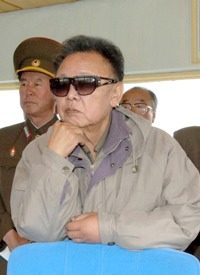
Reuters noted that analysts believe Kim Jong-il may be using the escalating tension over the North’s nuclear testing and missile launches to better position himself with behind-the-scenes power elites in his country. It is believed that the dictator, who is in his late 60s, suffered a stroke last year and is either seeking to pass the torch of leadership or is being pressured to do so. U.S. intelligence indicates that more mid-range missile test launches may be coming in the near future, perhaps dictated by just how badly Kim Jong-il needs to solidify his grasp on power.
The degree of uncertainty about any of the North’s internal affairs was highlighted by Cai Jian, an expert on North Korea at Shanghai’s Fudan University. USA Today quoted him as saying that “no one outside North Korea really knows who will be picked as successor.” Choi Jin Wook, a North Korea analyst at the Korea Institute for National Unification in Seoul, thinks Kim Jong-un is “too young” and “doesn’t have any experience.” Jong-un, 26, would be beating out his older brother, Jong Chol, 27, and his half brother, Jong Nam, 38. Choi and other analysts believe the youngest son may end up as a figurehead for someone else who would be the real power behind the throne.
Choi says that the person likeliest to be this power behind the throne is Kim Jong-il’s brother-in-law, Jang Song Taek, 63. Jang married Kim’s younger sister but fell out of favor five years ago after being perceived as a danger to Kim’s hold on power. Since then he has apparently returned to Kim’s good graces and now holds a prominent position on North Korea’s National Defense Commission. Choi says Jang could work behind the scenes to gain control and eventually become the next dictator.
Another aspect to North Korea’s recent nuclear and missile tests and its beating of the war drums is that the appointment of Kim Jong-il’s youngest son could then be used as a way to lure the United States back to negotiations. The bait would be that Kim Jong-un is not his father and might be persuaded to soften his country’s stance on developing nuclear weapons. The United States would then open the spigots of foreign aid while the North wouldn’t really have to change anything.
North Korea knows that they have a good deal. Whenever they need to do some actual nuclear testing that they can’t keep secret, or when their leadership needs to solidify its grasp on power, they can harden their stance and isolate themselves for a time. Then, when the need is past, they can appear to soften their stance and be paid off in aid while continuing to develop nuclear weapons technology in less noticeable ways.
When it’s time for another live test explosion or a regime change, expect to hear the beat of war drums once again. And through it all, look for the UN to continue gaining in stature as it denounces North Korea but does nothing truly effective to bring about the end of communism in that unfortunate nation. The United Nations knows too that it has a good deal. The North’s agitations will continue to create the apparent need for an international solution to nuclear proliferation, and the UN wants to become powerful enough so it can claim to be that solution. The status quo mutually benefits both North Korea and the United Nations while leaving the United States as the loser.
AP Images Photo: Kim Jong-il



